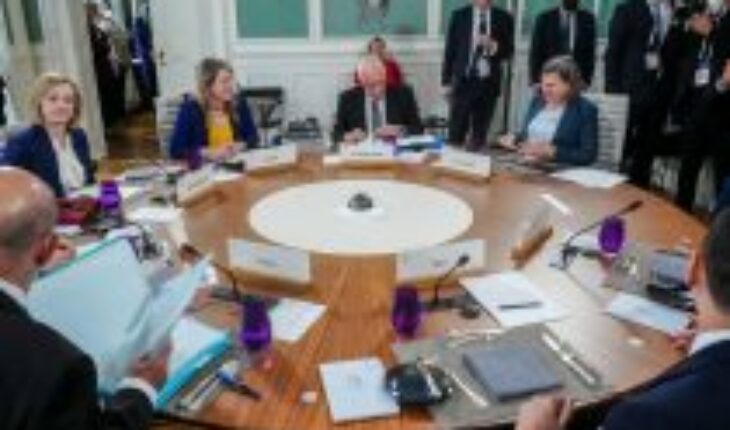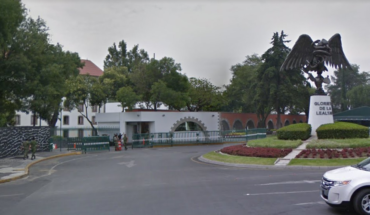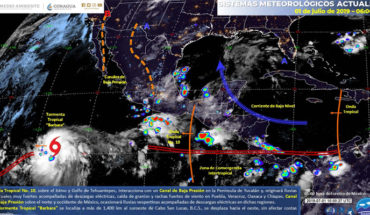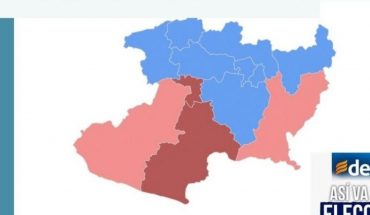The Group of Seven (G7) foreign ministers vowed on Saturday to tighten Russia’s economic and political isolation, continue to supply arms to Ukraine and tackle what Germany described as a “wheat war” waged by Moscow.
After meeting at the Baltic Sea resort of Weissenhaus, senior diplomats from Britain, Canada, Germany, France, Italy, Japan, the United States and the European Union also pledged to continue their military and defense assistance for “as long as necessary.”
They also said they will examine what they described as Russian misinformation aimed at blaming the West for food supply problems around the world, due to economic sanctions on Moscow, and urged China not to help Moscow or justify the war, according to a joint statement.
“Have we done enough to mitigate the consequences of this war? It is not our war. It’s a war of the president of Russia, but we have a global responsibility,” German Foreign Minister Annalena Baerbock told reporters at the closing news conference.
The key to putting more pressure on Russia is to ban or phase out the purchase of Russian oil and EU member states are expected to reach an agreement on the issue next week, even if Hungary finds itself at this stage with opposition.
“We will accelerate our efforts to reduce and end dependence on Russian energy supplies as quickly as possible, based on G7 commitments to eliminate or ban imports of Russian coal and oil,” the statement said.
The ministers said they would add more sanctions on Russian elites, including economic actors, central government institutions and the armed forces, allowing President Valdimir Putin to “lead a war he has chosen himself.”
The meeting in northern Germany, attended by the foreign ministers of Ukraine and Moldova, also highlighted concerns about food security and fears that the conflict could spread to its smaller neighbor, Moldova.
“People will die in Africa and the Middle East and we are faced with an urgent question: how can people around the world be fed? People are wondering what will happen if we don’t have the grain we need and used to get from Russia and Ukraine,” Baerbock said.
He added that the G7 would work to find logistical solutions to transport vital commodities from Ukraine’s storage ahead of the next harvests.
Attention is now turned to Berlin when ministers meet later saturday with Sweden and Finland, preparing to apply for membership of the transatlantic alliance, drawing threats of retaliation from Moscow and objections from NATO member Turkey.
“It’s important that we have a consensus,” Canadian Foreign Minister Melanie Joly told reporters when asked about the possibility of Turkey blocking its accession.
Mariupol, which has suffered the heaviest fighting in nearly three months of war, is now in Russian hands, but hundreds of Ukrainian defenders are still holding out at the Azovstal steelworks despite weeks of heavy shelling.
The harsh Ukrainian resistance, which analysts say was not anticipated by Russian President Vladimir Putin or his generals when they launched the invasion on February 24, has slowed and in some places reversed Russian advances to achieve absolute control of Ukraine.
In addition to losing a large number of men and a lot of military equipment, Russia is recovering from economic sanctions. The Group of Seven major world economies (G7) pledged on Saturday to “further increase economic and political pressure on Russia” and supply more arms to Ukraine.
The war has also prompted Finland and most likely Sweden to abandon their long-awaited military neutrality and seek NATO membership, a move Finnish President Sauli Niinisto defended in a phone call to Putin on Saturday.
Ukrainian President Volodymyr Zelensky referred to the plight of people trapped at the Azovstal plant in an overnight speech.
“Very complex negotiations are currently underway on the next phase of the evacuation mission: the withdrawal of thee the seriously injured, the doctors,” he said, adding that “influential” international intermediaries participated in the dialogues.
Russia, which initially insisted that defenders of the sprawling Soviet-era bunkers be turned in under the steel mill, has said little publicly about those talks.
Ukraine’s Deputy Prime Minister Iryna Vereshchuk told local television on Saturday that efforts are now focused on evacuating about 60 people, including the most seriously injured and medical personnel.
Diplomatic remezón
Moscow’s invasion, which calls it a “special operation” to disarm Ukraine and protect it from fascists, has shaken European security. Ukraine and its Western allies say fascism’s claim is a pretext for launching unprovoked aggression.
The Finnish minister told Putin that his country, which shares a 1,300-kilometer border with Russia, wanted to join NATO to bolster its security after the invasion of Ukraine, during a “direct, honest and uncredulous” conversation, according to Niinisto’s office.
Putin told Niinisto that it would be a mistake for Helsinki to abandon its neutrality, the Kremlin said, adding that the move could damage bilateral relations.
Russian Deputy Foreign Minister Alexander Grushko, quoted by Russian news agencies, said Moscow had no hostile intentions towards Finland and Sweden, but would take “appropriate precautionary measures” if NATO deployed nuclear forces and infrastructure closer to the border with Russia.
Russian Su-27 fighter jets took part in drills to repel a simulated airstrike on russia’s Baltic Sea enclave of Kaliningrad bordering Poland and Lithuania, the Interfax news agency reported on Saturday, citing the Baltic Sea fleet.
German Foreign Minister Olaf Scholz, who spoke to Putin by phone on Friday, said he did not detect any signs of change in the Russian leader’s thinking about the conflict.
In an interview for the t-online news website published on Saturday, Scholz also said that Western sanctions on Russia would remain in place until it reached an agreement with Ukraine, adding: “Our goal is for this invasion to fail.”
Follow us on





